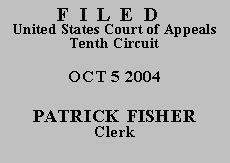

| UNITED STATES OF AMERICA, |
CR-01-1713-BB)
|
Mr. Gonzales pleaded guilty to possession of a firearm in furtherance of a drug trafficking crime, 18 U.S.C. § 924(c)(1)(A)(B)(ii). He was subsequently sentenced to 30 years imprisonment and five years supervised release. Mr. Gonzales filed a timely § 2255 motion, raising several issues all related to ineffective assistance of counsel. R. Doc. 1, 2, 10. After reviewing the merits of Mr. Gonzales's claims, the magistrate judge, in a recommendation apparently served on February 11, 2004, recommended that the motion be denied. R. Doc. 12. The magistrate judge's report further stated, "A party must file any objections within the ten day period allowed if that party wants to have appellate review of the proposed findings and recommendations. If no objections are filed, no appellate review will be allowed." Id. at 11-12.
On March 23, 2004, the district court adopted the magistrate's report and dismissed Mr. Gonzales's motion and entered judgment. R. Doc. 13, 14. No objections to the magistrate judge's recommendation had been filed by either party. Three weeks later, Mr. Gonzales filed a Notice of Appeal and Request for COA, and the district court denied a COA. R. Doc. 15. We issued a show cause order requiring Mr. Gonzales to address the apparent waiver issue in his opening brief on appeal.
The Tenth Circuit has a "firm waiver rule when a party fails to object to the findings and recommendations of the magistrate." Moore v. United States, 950 F.2d 656, 659 (10th Cir. 1991); see also Thomas v. Arn, 474 U.S. 140, 155 (1985) ("[A] court of appeals may adopt a rule conditioning appeal, when taken from a district court judgment that adopts a magistrate's recommendation, upon the filing of objections with the district court . . . ."). If the parties fail to make a timely objection,(*) they "waive[] appellate review of both factual and legal questions." Moore, 950 F.2d at 659. However, this rule does not apply when (1) a pro se litigant has not been informed of the time period for objecting and the consequences of failing to object, Id., or (2) the interests of justice require review, Wirsching v. Colorado, 360 F.3d 1191, 1997 (10th Cir. 2004).
Neither of the exceptions to the firm waiver rule apply in this case. Mr. Gonzales never filed objections to the magistrate's findings and recommendation. This despite the fact that the magistrate judge properly apprized Mr. Gonzales of the time period for filing objections and the consequences of failure to do so. Although Mr. Gonzales argues that the interests of justice exception should apply because he is a layman and has been misdirected in the past by jailhouse lawyers, he gives no specifics of any kind and our review of this matter fails to reveal any "interest of justice" exception. Consequently, neither of the exceptions to our firm waiver rule apply. See Fottler v. United States, 73 F.3d 1064, 1065 (10th Cir. 1996). As noted, Mr. Gonzales had notice, and there is no right to counsel for a § 2255 motion. Pennsylvania v. Finley, 481 U.S. 551, 555 (1987).
Accordingly, we DENY a COA and DISMISS the appeal.
Entered for the Court
Paul J. Kelly, Jr.
Circuit Judge
*."Within ten days after being served with a copy, any party may serve and file written objections to [the magistrate's] proposed findings and recommendations as provided by rules of court." 28 U.S.C. § 636(b)(1).